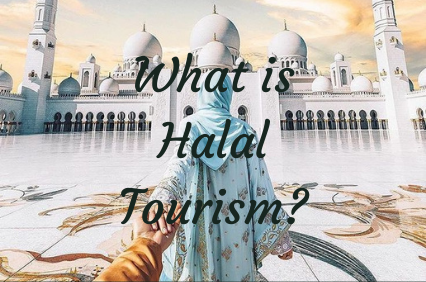Halal tourism is tourism in accordance with Islamic teachings in terms of diet, clothing, environment and rituals. The flight and hotels in such destinations do not serve alcohol and have separate swimming pools and spa facilities for men and women, serve only halal foods, no pork included in menu, have prayer facilities and religious programs are shown as part of entertainment offered. Internationally many hotels are serving halal food that is slaughtered in accordance with the teachings of Sharia and is free of any substances forbidden by Islam such as pork and alcohol.
Halal tourism is a growing market segment, with Muslim tourists seeking destinations which meet their needs. Burgeoning middle class and increasing disposable income, many countries – whether Muslim or not – are looking to attract these travelers. Muslims spend on halal tourism was valued at $189 billion in 2018, and is forecast to grow to $274 billion by 2024. It is essential to understand and spread the sustainable aspect of halal tourism in the global economy which can enhance the growth of the industry. This perspective will make all consumers welcome and accept halal tourism keeping aside any religious zeal.
At the same time, the global halal industry is still facing challenges in terms of creating awareness among the consumers, especially non-Muslim consumers, about the definition of halal which is beyond religion and has an implication to all human life in the world. The halal tourism industry is not an exception to such issues and challenges. Such issues lie within all the components of halal travel chain that includes halal foods, halal hotel and restaurant, Muslim friendly guide, halal medical care, halal logistics, and other products. Many consumers around the world especially non-Muslim consumers have a stereotype perception that the halal products are Islamic and only meant for Muslims. While targeting Muslim consumers, halal industry should not forget the huge size of non-Muslim travelers. Recent data shows, international travelers around the world was 1.19 billion in 2015 and projected to exceed 1.8 billion by 2030. It is possible to tap into the non-Muslim consumer market also by clarifying the universal concept of Halal and halal tourism and by increasing awareness on this among both Muslim and non-Muslim consumers.
It is important to note that halal tourism and halal-friendly tourism are different. Halal tourism means catering to Muslim travelers’ needs in a purely halal environment, which in today’s world is very hard. This makes it increasingly difficult to actually find countries to fit this bracket in the true form of halal tourism. Only the two Holy cities of Makkah and Madinah are in this category because they fulfil all the requirements and also Saudi Arabia in general. The close second potentially is Kuwait which is also a dry country that doesn’t serve alcohol but non-hijabs and less clothing can be seen from expats to some degree. Halal-tourism environment will have the following:
• Muslim country
• No alcohol
• Serve only Halal food
• Have prayer facilities easily available
• Not having options such as music, nudity etc Halal-friendly tourism is a much broader term and covers 90% of the travel options available to Muslim travelers. This is because even Muslim countries have alcohol options available in hotels and restaurants which therefore makes them non-halal for many strict Muslims. Halal-friendly refers to a service, a facility, or destination, it means that it has taken into account some faith-based needs of Muslim travelers but not all their needs. Halal-friendly countries are those countries that that are welcoming Muslim travelers, that have some facilities that are preferred by them such as food/prayer options or even privacy in accommodation. Halal-friendly tourism environment will have some of the following:
• Be accepting of Muslim travelers (being friendly to tourists)
• Places to pray
• Halal food option in the country/city
• Privacy for hijab-free holidays/accommodation for Muslims
